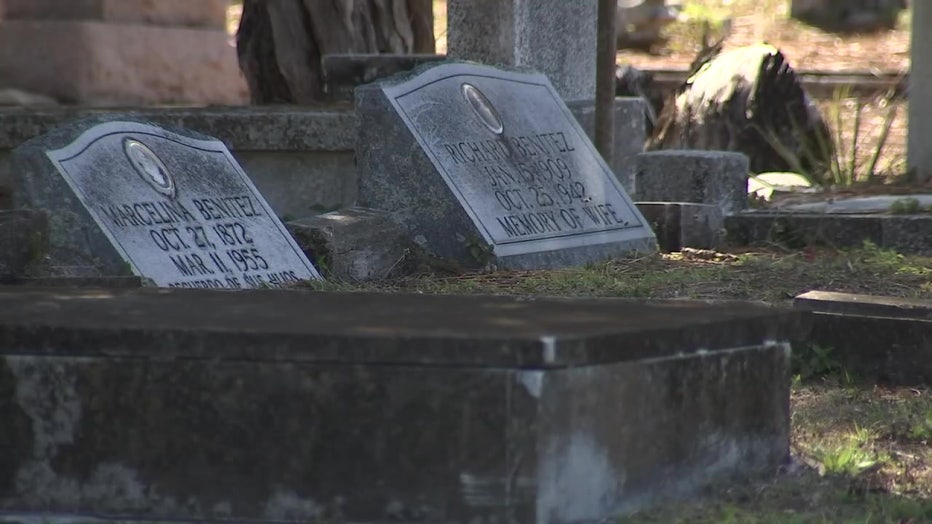City of Tampa adds protections against future developments over cemeteries

Protecting cemeteries
The City of Tampa is adding new protections for cemeteries after recent discoveries of African American burial grounds that were built over and forgotten.
TAMPA, Fla. - The City of Tampa added protections against future development over cemeteries, after communities raised the alarm about African American burial grounds that were built over and forgotten.
No longer will buried loved ones be paved over and forgotten.
"It's important because when the community speaks up about something that they're passionate about, we want to make sure that it's reflected in our city's long-term plan," said Stephen Benson, the city planning director for the City of Tampa.
Tuesday, the City of Tampa said city council approved changes to its land use policy to protect city-owned and privately-owned cemeteries against future development. It also applies to burial grounds that have yet to be discovered.

The city said future land use map amendments have been completed for Jackson Heights Cemetery, Marti-Colon Cemetery, Oaklawn Cemetery and Woodlawn Cemetery (including the Centro Asturiano located within).
"It gets into a lot of detail about what we value as a community and what we want to preserve and protect and expand. And so we based upon the research that was done, we felt like we could do better in terms of policy language," said Benson.
The move comes after several historically black cemeteries were rediscovered under buildings and property across the city in recent years. Fred Hearns, the Black history curator at the Tampa Bay History Center, works to preserve those stories.
PREVIOUS: Fight to save part of Woodlawn Cemetery goes before Tampa leaders
"It’s a victory for the work that I’m involved in with the Zion Cemetery Preservation and Maintenance Society. That’s one of the issues that we are very much concerned about," said Hearns. "Actually, this is a national issue. I’m very glad that the city took this action because we know that there are burial grounds that were forgotten, that were hidden, that were ignored for many, many years here in the city of Tampa."
Hearns focuses on Tampa’s historic African American Zion Cemetery. It was uncovered beneath the Robles Park housing complex in 2019. Since then, attention zeroed in on finding other sites developed over across Tampa Bay.
That included archaeological surveys for possible and/or confirmed graves at the following locations:
- Ridgewood Cemetery on the King High School property in Tampa
- St. Matthew Baptist Church Cemetery at FrankCrum property in Clearwater
- Port Tampa Cemetery at MacDill Air Force Base in Tampa
- North Greenwood Cemetery on Pinellas County Schools property in Clearwater
- Oaklawn Cemetery on the Tropicana Field’s parking lots 1 and 2 in St. Pete
- Moffett Cemetery and Evergreen Cemetery just south of that area.
Anthropologists like Antoinette Jackson are working to find more.
RELATED: Historical marker honors Tampa’s largest forgotten African American cemetery
"I know the St. Matthew Cemetery, they're continuing to do work in that area and found, you know, that there were, as they had suspected, bodies still under at least I think it was a business in the Clearwater area that they found that there were additional bodies," said Antoinette Jackson, an anthropology professor with the University of South Florida and founder of the Black Cemetery Network. "[There are] so many, many reasons sometimes why these cemeteries are unknown at this point. And so, [it’s] looking there to find out what other people are doing and to see that people are not alone or isolated and that this is more than a problem probably for your particular area, unfortunately."
The city’s comprehensive plan through 2040 now preserves city-owned and privately owned cemeteries, and it gives a guide.
"We added some policies that just clarified what do we do when we maybe discover a cemetery or what do we do when somebody proposes to develop on or near a cemetery? How do we even deal with that?" said Benson.
The city said the new policies also bolster Tampa’s ability to seek historic designations and compete for preservation grants. Plus, the changes are in line with the recommendations provided by the State Task Force on Abandoned African American Cemeteries, city officials said. The goal is for history to not repeat itself.
"We can’t go back and change what happened in the past, but we have to take responsibility for what we’re doing now to protect those burial grounds that may be uncovered in the future," said Hearns.
City officials said the amendment will be effective after the state completes its final sign off, and city officials expect to hear back from the state in mid-October. Then, the policies would be in effect at that time.

